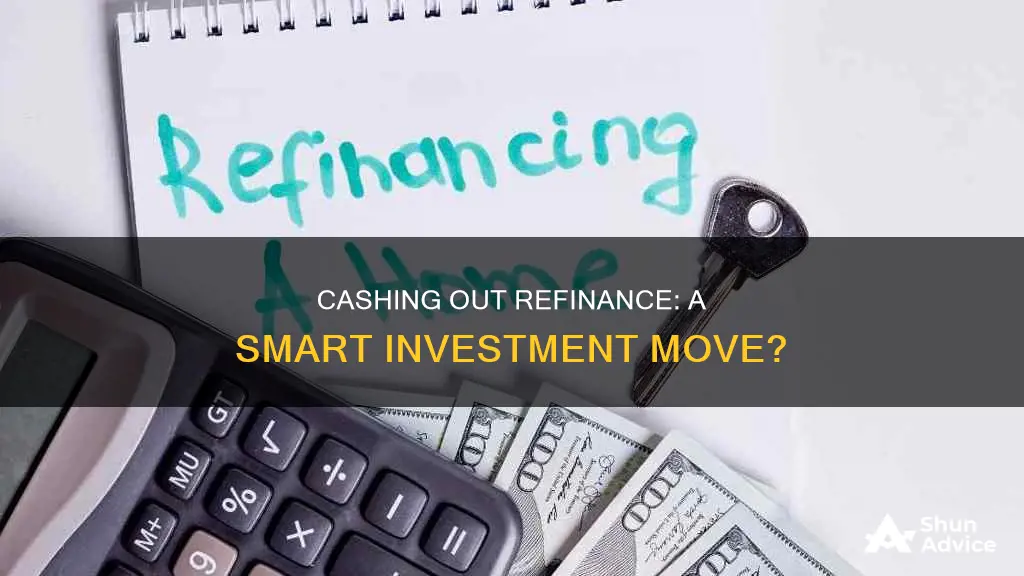
Cash-out refinancing is a way to turn the equity in your home into cash. It involves replacing your existing mortgage with a new, larger mortgage and taking the difference in cash. This money can then be used to fund investments. However, it is important to carefully consider the risks involved, as a cash-out refinance is still a loan, and you will be paying interest on the money withdrawn from your home equity.
| Characteristics | Values |
|---|---|
| Purpose | To turn home equity into cash |
| How it works | Replaces your existing mortgage loan with a new one for a larger amount than what you currently owe, and lets you pocket the difference between the two balances in cash |
| Requirements | Credit score of at least 620, debt-to-income ratio (DTI) no higher than 50%, enough home equity to still have 20% after cashing out |
| Pros | Lower interest rate, lower monthly payment, tax benefits, access to significant amount of money to invest |
| Cons | High fees and closing costs, risk of losing money, increase foreclosure risk, complicates finances |
What You'll Learn

Pros of cash-out refinancing
Cash-out refinancing can be a good strategy for investors in certain situations. Here are some pros of cash-out refinancing:
Access to a Large Sum of Money
One of the biggest advantages of cash-out refinancing is that it provides access to a large sum of money. Homeowners can unlock the home equity they have built up and use it for various purposes, such as funding investments, consolidating debt, or making large purchases. This can be particularly useful if you need to cover unexpected expenses or want to invest in a new business venture.
Lower Interest Rates
Cash-out refinancing may offer lower interest rates compared to credit cards and personal loans. This means that you could save money by consolidating your high-interest debt with a cash-out refinance. Additionally, if mortgage rates have decreased since you originally took out your mortgage, you may be able to secure a lower interest rate on your new loan.
Predictable Payments with Fixed-Rate Loans
If you opt for a fixed-rate loan during cash-out refinancing, your monthly principal and interest payments will remain the same throughout the loan term. This provides stability and predictability, which can be especially beneficial for those on a tight budget or those who want to avoid the risk of variable interest rates.
Potential Tax Deductions
If you use the cash from a cash-out refinance to make eligible home improvements, you may be able to deduct the interest paid on the loan when filing your taxes. This can result in significant savings, especially if you are making substantial renovations or upgrades to your property.
Potential to Boost Your Credit Score
Using a cash-out refinance to consolidate higher-interest debt can also have a positive impact on your credit score. Paying off credit cards in full and reducing your credit utilization ratio may lead to an improvement in your creditworthiness.
OPay Cash Investment: Legit or Scam?
You may want to see also

Cons of cash-out refinancing
Cash-out refinancing can be a risky strategy, and it is not suitable for everyone. Here are some of the potential disadvantages to consider:
Risk of Foreclosure
If you can't make the payments on your new mortgage, you could lose your home. Cash-out refinancing increases your mortgage balance, and if you fail to repay the loan, your home could be at risk of foreclosure. This is a serious risk, and it's important to ensure you can afford the new payments before taking out a cash-out refinance.
Prolonged Repayments
If you use a cash-out refinance to consolidate debt, you may be spreading the repayments over a longer period. While this can reduce your monthly outgoings, it may also mean that you end up paying more overall. It's important to consider the total cost of the loan, not just the monthly payments.
High Fees and Closing Costs
Cash-out refinancing can come with high fees and closing costs, which can be as much as 5% of the total loan amount. These costs can negate any savings you make through the refinance, so it's important to factor them into your calculations.
Risk of Losing Investment
If you invest the money from a cash-out refinance, there is a risk that you could lose it. This is especially true if you invest in stocks, which can be volatile. If you need to access the money soon and the stock market is performing poorly, you could be forced to sell at a loss.
Complications with Selling
If you plan to sell your home soon, cash-out refinancing may not be a good idea. It lowers your home equity, which means you'll see a smaller profit on the sale. It also takes time to complete the refinancing process, which may not align with your timeline for selling.
Fantasy Football Cash: Strategies for Smart Investments
You may want to see also

Pros of using cash-out refinancing to buy stocks
- Lock in massive outperformance: If the stock market is down for the year and you use the cash from a cash-out refinance to buy stocks, you will instantly lock in outperformance. For example, if the S&P 500 is down 10% for the year and you purchase stocks, you will always be outperforming the index.
- Take advantage of lower interest rates: When interest rates are low, the cost of borrowing is reduced, and there is a higher chance of earning a greater return.
- Diversify your net worth: If a large percentage of your net worth is in real estate, you may want to do a cash-out refinance to diversify your net worth.
- Get a tax deduction: You may be able to claim a tax deduction on the interest paid on a cash-out refinance if the money is used to buy, build or improve your home.
- Lower interest rates than other loans: Cash-out refinancing often has lower interest rates than home equity loans, personal loans, and credit cards.
Chipper Cash Investment: A Guide to Getting Started
You may want to see also

Cons of using cash-out refinancing to buy stocks
Cash-out refinancing to buy stocks is not always a good idea and carries several risks. Here are some cons to consider:
Risk of Losing Money
Investing in stocks is inherently risky, and there is no guarantee of making gains. The stock market can be volatile, with frequent and significant ups and downs. If you invest your home equity and the market takes a downturn, you could lose your entire investment. This would not only result in a loss of money but also put your home at risk if you can't make the payments on the cash-out loan.
Extending Repayment Period
By refinancing your mortgage, you are essentially restarting the repayment clock. This means that even if you secure a lower interest rate, you could end up paying more over the life of the loan due to the extended repayment period.
Higher Payments and Risk of Foreclosure
Refinancing may result in higher monthly payments, which could be challenging to keep up with. If you can't make the new mortgage payments, you risk foreclosure and losing your home.
Cost of Cash-Out Refinancing
The cost of cash-out refinancing is typically higher than rate-and-term refinancing. The fees and closing costs can be substantial, possibly ranging from 2% to 6% or even more of the total loan amount. This added expense could offset any potential gains from investing in stocks.
Time Considerations
The process of obtaining a cash-out refinance can take time, typically 30 to 60 days or more. This delay could cause you to miss out on investment opportunities in the stock market.
QuickBooks: Entering Invested Cash the Right Way
You may want to see also

Pros and cons of using cash-out refinancing to buy real estate
Cash-out refinancing is a way to unlock the equity in your home. It involves taking out a new mortgage that is larger than your current one, and receiving the difference in cash. This can be a risky strategy, but it can also pay off if you make a smart investment. Here are some pros and cons of using cash-out refinancing to buy real estate:
Pros:
- Lower interest rates: A cash-out refinance may offer a lower interest rate than a home equity loan or line of credit. This can save you money on your monthly payments and over the life of the loan.
- Tax benefits: If you use the cash-out funds to buy, build, or improve your home, you may be able to take advantage of the mortgage interest deduction. This can further reduce your tax liability.
- Diversification: If you have a large percentage of your net worth in real estate, a cash-out refinance can help you diversify your portfolio by investing in other types of assets.
- Higher returns: Real estate tends to be a less volatile asset class than stocks, and it can provide a steady income stream through rent. Over time, real estate values also tend to increase, providing the opportunity for capital gains.
Cons:
- Risk of foreclosure: If you can't make the payments on your new, larger mortgage, you could lose your home to foreclosure. This is a serious risk that should not be taken lightly.
- High fees and closing costs: Cash-out refinances typically come with higher fees and closing costs than a traditional refinance. These costs can eat into your profits or increase your losses if the investment doesn't pay off.
- Time to receive funds: It can take 30 to 60 days or more to receive the cash from a cash-out refinance, which means you may miss out on investment opportunities.
- Complicated finances: Taking out a new, larger mortgage can complicate your finances and increase your monthly payments. It's important to carefully consider whether you can comfortably afford the new loan.
Investing Strategies for Effective Cash Management
You may want to see also
Frequently asked questions
A cash-out refinance is a type of mortgage where you refinance your existing home loan for an amount larger than what you currently owe, and you receive the difference as a lump sum cash payment.
Pros:
- You can lower your interest rate.
- Your cost to borrow could be lower.
- You can improve your credit.
- You could take advantage of tax deductions.
Cons:
- Your interest rate might go up.
- You could be prolonging repayments.
- You have a greater risk of losing your home.
Some alternatives include a home equity line of credit (HELOC), a home equity loan, a personal loan, or a reverse mortgage.







